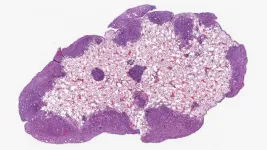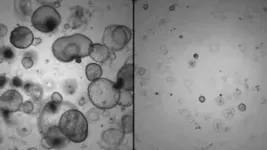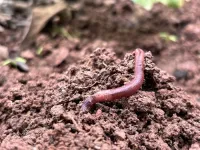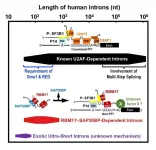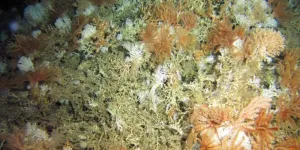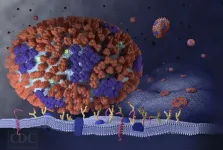(Press-News.org) Scientists at Cold Spring Harbor Laboratory (CSHL) and the University of California, Davis have reached a new breakthrough in pancreatic cancer research—eight years in the making. It could help slow the disease’s deadly spread.
In 2017, as a postdoc in CSHL’s Tuveson lab, Chang-il Hwang and collaborators from the Vakoc lab uncovered a protein essential for jumpstarting metastasis in pancreatic ductal adenocarcinoma (PDAC). Now an assistant professor at UC Davis, Hwang recently reunited with CSHL Professors David Tuveson and Christopher Vakoc. The trio once again set their sights on PDAC. The disease is known for its aggressiveness. It often spreads to other organs like wildfire, wreaking havoc in its path.
“Metastatic spread is one of the reasons pancreatic cancer is such a deadly disease,” Vakoc says. “Our study led by Dr. Hwang has opened the door to new insights we might one day use to combat aggressive PDAC.”
The team found that late-stage PDAC hijacks a protein called Engrailed-1 (EN-1) to evade the body’s natural cancer defenses. EN-1 is a type of protein known as a transcription factor. These proteins control the timing and duration of gene expression. This particular transcription factor is required to form major areas of the brain.
“EN-1 is known to play a role in neurodevelopment,” Hwang explains. “In the pancreas, it’s not normally expressed. But in the later stages of pancreatic cancer, it gets overly expressed and makes the cancer more metastatic.” That means a faster, deadlier spread. But what if EN-1 could be targeted in cancer? Hwang, Tuveson, and Vakoc sought to find out.
The team used organoids—mini versions of tumors—to identify the role of over-expressed EN-1 in PDAC. They found that higher levels of the aberrant protein blocked genes associated with natural cell death. When EN-1 expression was curtailed, the genes it targets were able to do their job, promoting healthy cell survival.
“Without EN-1, cancer progression slows,” Hwang says. “At the moment, it’s hard to target transcription factors with drugs. But in the future, it may be possible to disrupt the kind of interactions we see with mutated EN-1 in PDAC.”
Pancreatic cancer remains the third-leading cause of cancer-related deaths in the U.S. Hwang plans to continue collaborating with CSHL in hopes that his team’s work may lead to better treatments.
“We know certain types of PDAC are dependent on EN-1,” Hwang says. “If we can develop a way to test for it, we can create more personalized therapeutics and treatment strategies for patients. We’re looking forward to heading in that direction.”
END
Pancreatic cancer hijacks a brain-building protein
2024-02-14
ELSE PRESS RELEASES FROM THIS DATE:
Pesticides to help protect seeds can adversely affect earthworms’ health
2024-02-14
While pesticides protect crops from hungry animals, pesky insects, or even microbial infections, they also impact other vital organisms, including bees and earthworms. And today, research published in ACS’ Environmental Science & Technology Letters reveals that worms are affected by the relatively small amounts of chemicals that can leach out of pesticide-treated seeds. Exposure to nonlethal amounts of these insecticides and fungicides resulted in poor weight gain and mitochondrial DNA (mtDNA) damage in the worms.
Pesticide treatment can be introduced at several different ...
Discovery of a subset of human short introns that are spliced out by a novel mechanism
2024-02-14
In humans, the length of pre-mRNA varies extensively (from 30 to 1,160,411 nucleotides by recent studies). The fundamental mechanism of splicing has been studied with model pre-mRNAs including 158- and 231-nt introns, for historical instance, that are spliced very efficiently in vitro and in vivo. Such an ideal pre-mRNA contains good splicing signal sequences, i.e., the 5′ splice site, the branch-site (BS) sequence, and the polypyrimidine tract (PPT) followed by the 3′ splice site that are recognized by U1 snRNP, U2 snRNP and U2AF2–U2AF1, respectively. Prof. Mayeda says, “Given the diverse lengths ...
Cold-water coral traps itself on mountains in the deep sea
2024-02-14
Corals searching for food in the cold and dark waters of the deep sea are building higher and higher mountains to get closer to the source of their food. But in doing so, they may find themselves trapped when the climate changes. That is shown in the thesis that theoretical ecologist Anna van der Kaaden of NIOZ in Yerseke and the Copernicus Institute for Sustainable Development in Utrecht will defend on Feb. 20 at the University of Groningen. “When the water gets warmer, these creatures prefer to be deeper, but a coral doesn’t just walk down the mountain,” Van der Kaaden said.
Deep and dark
Unlike the famous, colorful tropical corals, cold-water corals live ...
Cost-effective to routinely change surgical gloves and instruments as well as being safer
2024-02-14
Surgeons who routinely change surgical gloves and instruments are incurring similar costs to those using the same equipment, a new study has found.
The economic evaluation funded by the UK’s National Institute for Health and Care Research (NIHR) follows a clinical trial conducted at 80 hospitals in Benin, Ghana, India, Mexico, Nigeria, Rwanda, and South Africa which established that routine change of gloves and instruments reduces surgical site infections (SSIs) by 13%.
The evaluation, published by the Lancet Global ...
Scientists discover hidden army of lung flu fighters
2024-02-14
Scientists have long thought of the fluid-filled sac around our lungs merely as a cushion from external damage. Turns out, it also houses potent virus-eating cells that rush into the lungs during flu infections.
Not to be confused with phages, which are viruses that infect bacteria, these cells are macrophages, immune cells produced in the body.
“The name macrophage means ‘big eater.’ They gobble up bacteria, viruses, cancer cells, and dying cells. Really, anything that looks foreign, they take it up and destroy it,” said UC Riverside virologist Juliet Morrison, who led the discovery team. “We were surprised to find them in the lungs ...
USC announces new Leonard D. Schaeffer Institute for Public Policy & Government Service
2024-02-14
USC, together with Leonard and his late wife Pamela Schaeffer, is launching a new institute with a $59 million gift from the Schaeffers to be anchored in Los Angeles and in the university’s new Capital Campus in Washington, D.C. The mission of the Leonard D. Schaeffer Institute for Public Policy & Government Service is to strengthen democracy by training generations of public leaders and advancing evidence-based research to shape policy that addresses the nation’s most pressing issues, USC President Carol Folt announced ...
Nearly 15% of Americans deny climate change is real, AI study finds
2024-02-14
ANN ARBOR—Using social media data and artificial intelligence in a comprehensive national assessment, a new University of Michigan study reveals that nearly 15% of Americans deny that climate change is real.
Scientists have long warned that a warming climate will cause communities around the globe to face increasing risks due to unprecedented levels of flooding, wildfires, heat stress, sea-level rise and more. Though the science is sound—even showing that human-induced, climate-related natural disasters are growing in frequency ...
Red nets signal “stop” to insect pests, reduce need for insecticides
2024-02-14
Red nets are better at keeping away a common agricultural insect pest than typical black or white nets, according to a new study. Researchers experimented with the effect of red, white, black and combination-colored nets on deterring onion thrips from eating Kujo leeks, also called Welsh onions. In both lab and field tests, red nets were significantly better at deterring the insect than other colors. Also, in field tests, onion crops which were either partially or fully covered by red netting required 25-50% less insecticide than was needed for a totally uncovered field. Changing agricultural nets from black or white to red could help reduce pesticide ...
AI tool predicts function of unknown proteins
2024-02-14
A new artificial intelligence (AI) tool that draws logical inferences about the function of unknown proteins promises to help scientists unravel the inner workings of the cell.
Developed by KAUST bioinformatics researcher Maxat Kulmanov and colleagues, the tool outperforms existing analytical methods for forecasting protein functions and is even able to analyze proteins with no clear matches in existing datasets[1].
The model, termed DeepGO-SE, takes advantage of large language models similar to those ...
Promising new therapeutic approach for treating metastatic pancreatic cancer
2024-02-14
A research paper published today (14 February 2024) in Nature Cancer details new insights into the role of efferocytosis – the burying of dead cells – in pancreatic cancer that spreads to the liver.
Liver metastasis occurs in 40–50% of people with pancreatic ductal adenosarcoma (PDAC), and there are currently no effective therapies to cure pancreatic cancer patients that have liver metastasis.
Led by University of Liverpool’s Professor Michael Schmid and colleagues, this study found PDAC metastases to show high levels of immunosuppressive macrophages, a type of white blood ...
